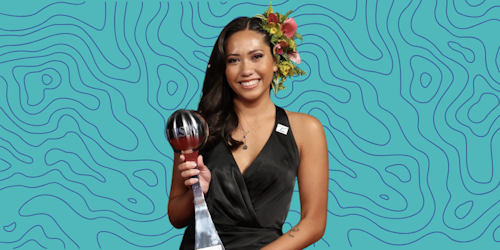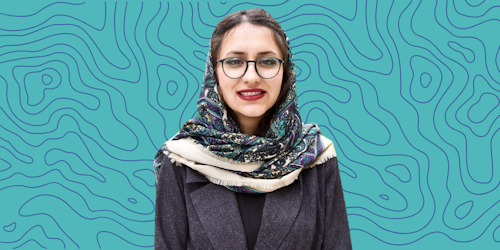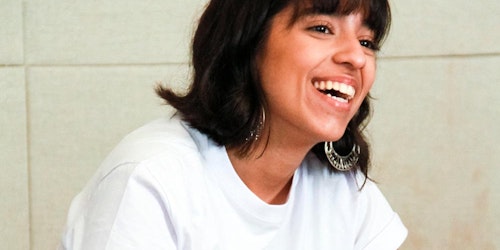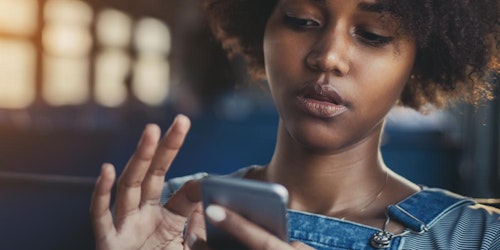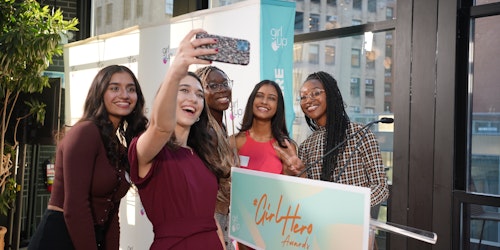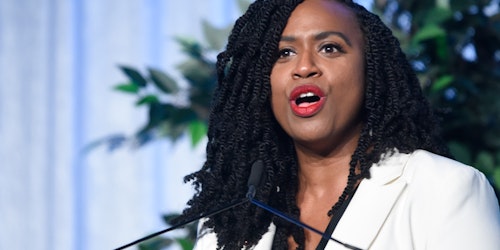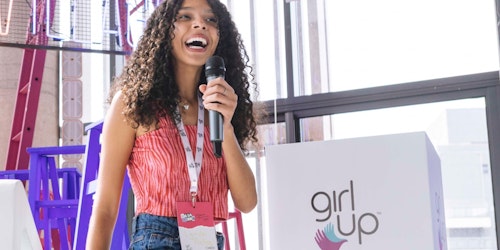Farkhunda Muhtaj is not just a name synonymous with women’s soccer in Afghanistan, but also hope and resilience. As captain of the Afghanistan Women’s National Team, her journey is a testament to the power of sport to transcend borders and inspire impact. “Even before sports though, education is crucial,” she emphasizes. “If you’re educated, you understand the power of sport and if you’re not, sport is just the game for you when we know it’s far greater than that.”
Yet, Farkhunda’s advocacy extends off the pitch. Through her leadership as a founder of a nonprofit organization and active refugee activist, Farkhunda Muhtaj is not only changing the world of sports but also striving to create a more inclusive and equitable world for all. “I work with global organizations to advance gender equity, anti-racism through sport, and social impact strategies because, for me, it’s not just the work you do on the pitch. We’re role models off the pitch as well,” she explains.
In our conversation with Farkhunda, she candidly shares the trials and triumphs of leading a national team amidst profound challenges, her unwavering commitment to refugee rights, and her vision of sports as a catalyst for societal change.

Can you share with us your journey of becoming the captain of the Afghanistan Women’s National Football Team?
My parents are from Afghanistan. Unfortunately, the first time the Taliban gained control of Afghanistan in the early 90s, they fled the country and became refugees in Pakistan. Years later, when I was two years old, they immigrated to Canada. Growing up in Canada was always such a huge blessing. I had so many resources and support at my disposal, but I never lost sight of where I came from and my purpose. I learned how to read and write Farsi. I learned about my identity as a Muslim Afghan-Canadian, and I learned to stay true to my values. I always wanted to give back to Afghanistan–my home, my parents’ home, and a nation I felt deserved better. I felt that if I focused on myself–my academics and my athletics–and grew, I could help benefit society in a meaningful way.
I was still connected to what was happening in Afghanistan, from both an Afghan and Western lens through television and the media. Unfortunately, I saw recurring themes of the devastating side of Afghanistan, but I didn’t see the positive side. So I wanted to help transform not only the impact but also the perception of Afghanistan.
I ended up going to York University, where I studied Kinesiology and Health Sciences while being a varsity student-athlete as captain of the university women’s soccer team. In my second year of university, I was recruited to play for the Afghanistan Women’s National Team. At the time, Afghanistan was investing in more foreign players and in the vision they had to grow women’s football. When they found out I was a top player in Canada, they invited me to a training camp, and right away, I got selected, so from 2016 onwards, I played for the Afghanistan Women’s National Team.
It was a very emotional journey for me in so many ways. I was very proud to play for my nation and represent my parents’ birth country, but it was so much more than football. It was an opportunity to shift gender norms and stereotypes, to help advance women’s rights and gender equity within the nation, and to inspire other females and even males to push forward to achieve their dreams. It’s always been for the people of Afghanistan–to bring pride to the nation, to have them look up to female role models–so that was and continues to be an honor.
It was a very emotional journey for me in so many ways. I was very proud to play for my nation and represent my parents’ birth country, but it was so much more than football.
In 2018, I became captain of the Afghanistan Women’s National Team. During that time, there was a lot of turmoil within Afghanistan and the Football Federation so I had to stand up and take leadership to continue our impact because we were playing for the young girls in Afghanistan, the people of Afghanistan, and our mission was always to drive change and inspire a whole nation.
Watch Farkhunda share the inspiring story of how she led the evacuation efforts of the Afghanistan Youth National Team when the Taliban regained control of Afghanistan in 2021.
The current situation in Afghanistan does not allow the Afghanistan Women’s National Team to officially compete in FIFA competitions due to the restraints and restrictions the government has imposed. Yet, I continue to coach the young girls as Ayenda FC, where we compete unofficially as a national team in competitions and training camps across Europe. “Ayenda” means future in Farsi and I believe they are the future of our nation.

In our Afghan community, there are fewer female leaders—particularly in sports—for young girls to look up to. I remember back in 2012 when football became a popular game in Afghanistan, I was in school, and I had never seen a woman playing football. That too an Afghan woman. I used to play football with my brothers, but I had never thought there would be women playing at a national level so that’s really inspiring.
You mentioned facing challenges when the government was overthrown. That was, I think, a very challenging period for all of us. There were a lot of Girl Up youth members who wanted to leave the country and while some of them did, some didn’t. We eventually had to stop our [Girl Up Club] activities in Afghanistan because the two times our Club hosted meetings, the areas where they met were bombed a few minutes later and I thought to myself, I cannot take this risk. If I’m not there, I cannot ask somebody else to be doing these activities when their lives are at risk. So, I know there are a lot of obstacles within activism.
What are some of the biggest obstacles you’ve faced as a female athlete and as a refugee activist, and how have you overcome them?
Growing up in Canada, people believe it’s a perfect world where females don’t face any discrimination or stereotypes associated with athleticism. But I think that’s far from the reality. Growing up playing football, I did have opportunities. I did have facilities. But it wasn’t something that was always looked up to. Yes, you were an athlete, but that meant you were “less feminine,” which is not true. The fact that athleticism was associated with masculinity was interesting, because while this department is very male-dominated, that doesn’t mean females can’t do just as well in this sphere.
Specifically, when playing for the Afghanistan Women’s National Team, gender was a big issue. We had less funding available to compete in tournaments or training camps. I understand that Afghanistan is a less-resourced country, so I don’t place blame on the nation; it’s just the circumstances we were placed in. We were never publicized so you almost felt they weren’t proud of their female athletes. Afghanistan is a very traditional nation so they never promoted women’s sports. Lots of people don’t know who plays on the Afghanistan Women’s National Team and who the athletes from Afghanistan are because it’s something that’s shied away from in a conservative country that doesn’t necessarily see women’s sports participation as something to be proud of.

I felt for the girls who were in Afghanistan competing because those young ladies were subjected to slurs and negative associations concerning football. Their families weren’t always supportive of them. And the list goes on and on. They faced many challenges and barriers regularly competing in sports.
That’s why we continue to play: To show individuals that not only are female athletes capable but also they are as passionate about and committed to sports as much as anyone else. The girls in Afghanistan were willing to risk their lives to play a sport. That says a lot about their commitment to it.
My parents were refugees and I know they faced so many different obstacles beyond financial constraints. When you are forced out of your country, it’s hard to come to terms with the fact that you now have to rebuild your life around something you had never imagined in a nation you’re unfamiliar with. On top of that, the whole situation of being a refugee where you’re not fully accepted and welcomed and embraced. You’re coming to a new community where you experience challenges with language and a new setting.
That’s why we continue to play: To show individuals that not only are female athletes capable but also they are as passionate about and committed to sports as much as anyone else.
I was two years old when I came to Canada so there was a lot of learning and unlearning that had to happen. You’re disadvantaged in many ways because you’re unfamiliar with the system; you don’t know how to do well until you live there and experience it. These are some of the challenges my family and other newcomer families have experienced and continue to experience. That’s why I want to be there for new refugees during their settlement journey, so I can provide all the knowledge, connections, and resources they need to hopefully fast-forward some challenges.
As a refugee activist, one of the challenges you face is people not understanding the scope of the refugee issue globally. There are over 110 million displaced people and there’s a lot of stigma associated with refugees and newcomers. People assume that they steal your job, they’re uneducated, they want to come to your nation, and that is far from reality. If their nations were safe and they had the environment to be able to stay, they would remain and focus on building their own nations. They don’t take jobs, they increase and improve the country’s economy. They are drivers of diversity, not just in the way we appear, but in the diversity of thought, diversity of leadership, and diversity of culture. But unfortunately, certain media and governments want to increase fear and make it seem like they’re stealing our resources. So even though we know how much of an immediate positive impact they have and how much society is better with them, it’s hard to make people understand the benefits when all they hear is the negative sides of refugees and newcomers.
In your opinion, what more can be done at the international level to address the specific needs and challenges faced by refugee women and girls? And how do you envision the future of Afghan women’s football, considering the current socio-political climate?
Currently in Afghanistan, there are a lot of restrictions for women beyond just sport: Education beyond the age of 12, restrictions with work, and not being able to freely walk around for instance. I have been adamant about bringing women’s football and women’s sports back to Afghanistan, and pushing forward through FIFA, the Afghan Football Federation, and the international community that advocates for women’s sports participation. It was, and continues to be, a very challenging experience because there’s a huge disconnect between the government, the Football Federation, FIFA, and with the safety protocols that returning to sport would come with. I would never want to risk anyone’s life to start sports again. However, I also want to continue pushing forward in a meaningful way that will diplomatically bring change.
What I do hope for is that in the near future, we come to a conclusion in a way that will not negatively impact anyone’s life so that women’s sports can continue and Afghan females can represent their nation once again.
But even before a sport, it is disheartening to see that education is banned. That’s a very, very, very basic human right. And if we’re not educated, Afghanistan will never advance. So if we do want to think about how to improve our nation, the most important way is through education. If our sisters or mothers are not educated, the next generation of Afghanistan will not be educated. I know I don’t have the solutions to everything and I know we can’t solve every problem, but I think we all have a responsibility to push forward. I believe in the power of numbers and if all of us Afghans and other individuals that are passionate about supporting Afghanistan can come together and drive that change, put pressure on the government, and help them understand why certain policies are not only going to impact Afghanistan now but negatively impact the nation moving forward, those are conversations that need to be had immediately. We need action.
If our sisters or mothers are not educated, the next generation of Afghanistan will not be educated.
What are some of the projects that you’re involved in supporting refugee communities, particularly women and girls, and how can we as individuals or as organizations support them and the refugee community?
There are a couple of different projects that I’m involved in. When I helped evacuate the Afghan Youth National Team, what we’re doing with these young girls and their family members is building a holistic approach. So they go to school, they have tutoring support, and they also play football for their local club team in the evenings. Aside from that, I facilitate virtual workshops for them, such as resume building or understanding how to rebuild their lives in their host nation, despite the challenges that they may experience. I want to make sure that while they’re in high school, they’re doing very well. So when the time for university comes, they have scholarship opportunities. They’re able to study in any part of the world, and they’re able to use that to give back to their host nation and other Afghans globally.
At home, I have my nonprofit organization, Scarborough Simba, which is an organization that uses sports to help ease the settlement journey of refugees and newcomers to Canada. I have a new project as well, Project Purpose, that uses leadership development programs to help individuals understand their purpose in life. Aside from that, I am an ambassador for many organizations, including UNHCR Netherlands and Penny Appeal Canada, and I’m also the Respect and Inclusion Ambassador for Respect Group.

Our societies are only going to move forward and sports are only going to be in a better place if we know that everyone is safe and welcome to them. I want to leave my mark and be able to support as many projects as I can but most importantly, help others understand they can never underestimate their impact. Whether it’s locally or globally, as long as you can support one individual, I think you’ve done a great service to humanity.
What advice would you give to young girls who aspire to pursue sports or activism despite facing numerous barriers?
Never underestimate your impact. I say that over and over again. Every girl I meet I tell her this because one step forward will open a hundred other doors if you’re willing to push through. So take one step at a time and you will be headed in a direction you never imagined.
This conversation has been edited for clarity and length. The views expressed are the speakers’ own.
Watch this space for more conversations with the world’s most influential female changemakers as part of our ongoing “In Conversation With” blog series!
